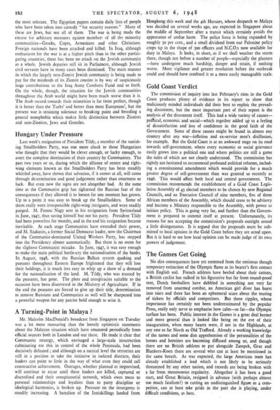Gold Coast Verdict
The commission of inquiry into last February's riots in the Gold Coast produces plenty of evidence in its report to show that maliciously minded individuals did their best to exploit the prevail- ing discontent, but the most important part of their report is the analysis of the discontent itself. This had a wide variety of causes- polttical, economic and social—which together added up- to a feeling of dissatisfaction and loss of confidence in the good faith of the Government. Some of these causes might be found in almost any country after any war—inflation and ex-service men's disillusion, for example. But the Gold Coast is at an awkward stage on its road towards self-government, where every economic or social grievance easily grows into a political one and where politics are still a game the rules of which are not clearly understood. The commission has rightly not hesitated to recommend profound political reforms, includ- ing a constitutional amendment which would provide for a much greater degree of self-government than was granted so recently as 1946. This would affect both local and central government. The commission recommends the establishment of a Goid Coast Legis- lative Assembly of 45 elected members to be chosen by new Regional Councils, and an Executive Council of nine members, five of them African members of the Assembly, which should cease to be advisory and become a Ministry responsible to the Assembly, with power to initiate policy. This is going very far, and further than the Govern- ment is prepared to commit itself at present. Unfortunately, its reasons for not accepting the commission's proposals outright sound a little disingenuous. It is argued that the proposals must be sub- mitted to local opinion in the Gold Coast before they are acted upon. But it is hard to see how local opinion can be made judge of its own powers of judgement.


































 Previous page
Previous page